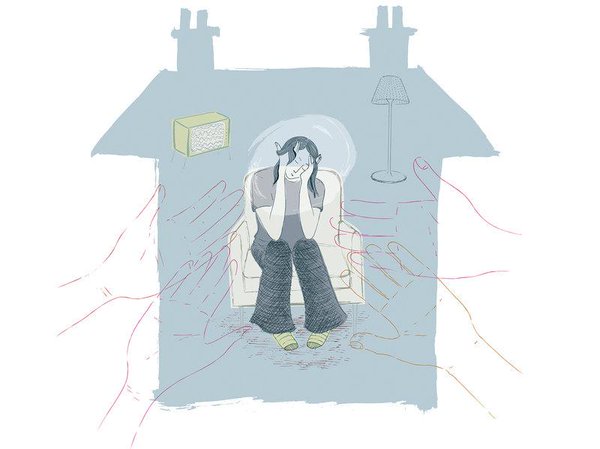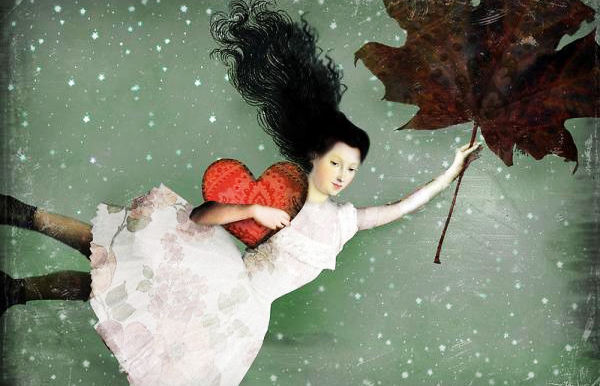pain
Monsters In My Head Or How I Battled And Defeated Obsessive-Compulsive Disorder – Part 3

Illustration by Trina Dalziel
Obsessive-compulsive magic is not only related to luck, be it good or bad; it also serves as a mental path for anxiety. Whenever the anxiety grows and becomes overwhelming, the sufferer feels compelled to turn to some sort of supernatural being for forgiveness, believing to be thus protected from the impending doom. Such reactions are almost primal in nature, deeply ingrained in our collective cultural consciousness, yet there is often a clinical aspect to them as well. Magic is the catalyst of anxiety and obsession, like an illogical sophism which on the surface appears to be valid, only to later prove itself false and turn against the sufferer.
I’ve been hesitating for quite a while, pondering whether I should be writing this text or not. I’ve feared that something bad could happen; should I write a text about OCD, the disease may progress and things may turn completely unbearable. These thoughts can reach very far; some people for instance believe that if they get out of bed in a different way or don’t touch the door threshold with this foot in precisely this manner, someone is going to die, themselves or someone they hold dear.
That moment when the OCD reaches its peak feels like an avalanche of thoughts and worries that ariseagainst your own will; it feels like you’re on the verge of doing something that contradicts your very structure. People worry that they will kill themselves although they don’t want to; that they’ll kill someone although they’re no criminals, and so on and so forth. Then they’ll tell themselves they actually are criminals, that they actually do want to kill themselves, and thus the incessant stream of anxiety will only get worse.
“It’s like dough”, Cristi told me during one of our meetings. “Dough you leave aside to grow, and it grows and grows and grows, until you find a needle at some point and you sting it and then bam, it’s gone.”
“You have to try to realise that no matter how real these thoughts seem to you, no matter how heavy and overwhelming, there’s no actual ground for worry, they’re merely thoughts, nothing will happen”, says IoanaBadulescu, a psychologist with multiple specialisations and the only person besides my family with whom I talk for hours every day.
“What’s up with these thoughts? They’re utterly meaningless, just brain farts. What if they come true? That’s about as probable as a meteorite hitting Earth right now. Sure, it might happen, but it won’t”, says Sorin. In the end, those tormented by obsessions end up realising either by themselves or with some external aid, that their doubts and worries are precisely the key to their suffering. In the past, obsessive-compulsive disorder was actually known as the “malady of the doubt”.
A new question arises, perhaps the most difficult of them all: “can I live without OCD?”. I, for one, find myself in a point where the most plausible answer is: “no, but it doesn’t really matter”. The agony I’ve had to bear until reaching this answer has been indescribable though.
If doubt and worry is the key to this disease, how do you differentiate between a natural and a sick dilemma? How can you tell which anxiety is real and which isn’t? Where does reality begin? Those are all questions to which I haven’t found an answer yet; all I know is that they are part of OCD and they will pass. At some point, I ended up playing with them so much that the line between reality and imagination started to blur; it seemed to me that things can be both real and unreal at the same time.
During my first session with Cristi, I told him that sometimes it seems to me that nothing is real, to which he replied: “Am I real? Are you real? All this happening right now is real.” And these aren’t even the hardest questions you end up asking yourself. Some sufferers end up asking themselves if they are themselves. This is the disease of reductio ab absurdum, of absurdly overanalysing that which is absurd to begin with.
I always have Ioana’s words in mind: “You have to remember this, there’s nothing more to it, no stake and no goal, and this is all there is to it, this terror and this torment, all this horror.”
All of a sudden, after having written this, a stream of thoughts began, impossible to contain and triggered by this coherent, structured analysis of the topic. So all of it is real!I said to myself. I should speak to Cristi about this: “all thoughts are real; it’s just that some of them are realistic and some others aren’t. These thoughts for instance aren’t realistic; it’s just that you invest more time than you should in them.”
I’ve stopped writing for a whole day afterwards. It’s funny that the paragraph describing my moment of anxiety begins with “all of a sudden” – it’s about an intrusive, unwelcome thought, specific to anxiety, as horrible and tormenting as it is inoffensive. I’ve described this state of mind as a “moment”, which means that I have clearly delimitated it from the other normal thoughts. In Psych 101, we are told that it’s a bit like a sort of schizophrenia where you never lose touch with reality, the two of them become distinct in the point separating disease from disorder and obviously, life from death.
Anxiety offers its sufferer two leitmotifs, insanity and death, as foundations for fear and worries. When anxiety occurs in an obsessive-compulsive form, the two of them can turn into obsessions. The sufferer will overanalyze everything, will tell themselves this is real, this is what they want, and they’ll be unspeakably tormented. To further fuel their anxiety, they’ll do their best to fake-convince themselves one or the other is bound to happen.
Some psychologists say death wishes are mere fantasies, ways of letting off steam and getting rid of accumulated tensions and emotions such as rage, which often feel like experiencing death itself. Usually, suicidal thoughts are associated with psychiatric disorders and depressions, and the life of those affected by them is often in danger.
It’s important that those with thoughts of suicide immediately seek help from a psychologist or psychiatrist in order to minimise the risks, because when it comes to psychological disorders, the best diagnostic is an individually customised one.
Ever since I started going to therapy, Cristi keeps telling me I should “explore, explore, explore”. Sadly, the OCD is lying to you. Your thoughts and feelings aren’t real, and the deeper you delve into the obsession, the more thoughts, ideas and conclusions, all similarly deceitful, start swirling through your mind. In the end, you may think you’ve finally figured out why your own brain is lying to you, but even so, the torment is far from over, as more doubts occur about the answers you’ve reached; you end up disregarding them, contradicting yourself and eventually turning around in perpetual circles.
Original Romanian version: casajurnalistului.ro/boala-indoielii
—
Mihnea Mihalache-Fiastru is licensed in Psychology, essay and fiction writer, author and contributor since 2001 for Hustler, Vice and many other publications and websites
Be the first to write a comment.
Your feedback
